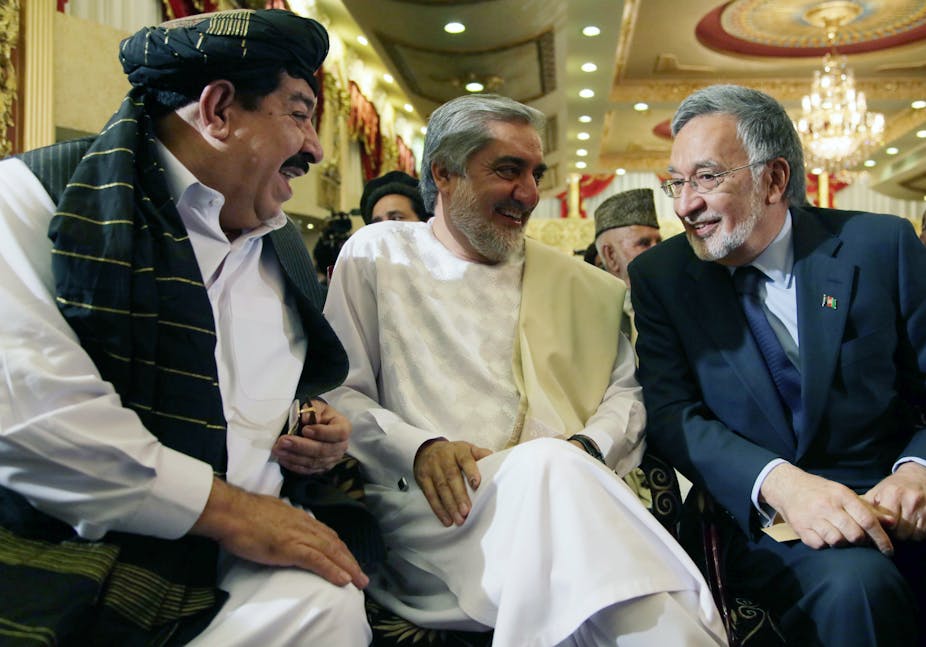The date for the second round of the Afghan Presidential elections has just been announced – June 14. It will be a run off between Abdullah Abdullah and Ashraf Ghani Ahmadzi. It can’t come soon enough for those whose business has been put on hold. Over the past few months I have become used to being the only guest in the restaurants around Kabul. The international community is still on lock-down – no one is allowed out of their compounds so I cannot persuade friends, Afghan or foreign, to join me, but I don’t lack for company. The waiters are bored and happy to chat.
Afghans are not shy about talking about salaries so I know that many have not been paid for months – some not since the Serena attack in March, others since the attack on the Lebanese Taverna in January. But still they turn up to work. As Harun, 18 years old and illiterate, commented: “What else can we do? It is not like we can get another job. We just have to hope that after the election the guests will come back and the boss will be able to pay us the money he owes us.”
Challenges ahead
The new president – at the moment most bets are on Abdullah Abdullah – will face economic challenges at least as, if not more, daunting than the political and security challenges. The unemployment rate in Afghanistan is estimated at 47% for 15-24 year olds and underemployment estimated by the World Bank to be 53% of the labour force. Child labour is endemic and poverty and poor child protection measures mean that some children are forced into bonded labour or sexual exploitation.
This fragile economy at the mercy of insurgent violence and a corrupt and often incompetent political elite has been further rocked by devastating floods in the north of the country, which have brought down mountainsides and villages, drowned hundreds of people, large tracts agricultural land, and destroyed crops and livelihoods.
On Wednesday, the Afghan Chamber of Commerce warned that growing insecurity in Kabul, Balkh and Nangarhar was undermining economic growth.
Over the past couple of years and hundreds of conversations with Afghans planning to leave the country, I have been struck by how often the threat of persecution and violence is seamlessly blended with the urgent need to find work and provide for one’s family to be expressed simply as “there is no future here”.
It was this pessimism about Afghanistan’s future that wrong-footed me and many commentators during the first round of the election. The sudden wave of hope that drowned cynicism and carried so many people to the polls took many by surprise.
However, the accusations (and evidence) of fraud in the less secure provinces, the disqualification of almost 250,000 of the 7m votes cast, the 40 days that have elapsed since the first round and the delays in announcing the second round have seen some of that hope and optimism ebb away.
Influence peddling
As the also-rans lined up behind the two front runners, the jockeying for positions in government was clearly about short-term access to influence and wealth rather than addressing political or human security. The belief that no one would want to risk current wealth by a return to violence and political instability seems misplaced.
Suggestions that a coalition between Abdullah Abdullah and Ashraf Ghani might form a partnership unifying the country and pooling their skills were met with rueful smiles of disbelief – not even Ashraf Ghani’s most ardent supporters believed he would or could put his ego aside for the good of the country. And yet however immoral, shameless and unscrupulous Afghanistan’s political elite are, they have not yet taken up arms against each other.
For the moment, the political system is holding. The delays are stretching it and legitimacy, but enough people want it to hold. It is not possible to speak of an “Afghan perspective” – like people everywhere, Afghans are a mixed bunch. Some are planting magnetic bombs under police cars and firing rockets into the airport. Some are forcing their daughters into burqas and marriages and their children to beg.
But others are working 12-hour days to send their children to school, studying at university, cleaning the drains and the streets, getting married, searching for work, investing in telcommunications and shopping malls, and generously sharing hospitality and laughter with strange foreign women.
While the elites play fast and loose with security, ordinary Afghans continue to build the future because as Harun, waiting for his wages, said: “What choice do we have?” It is that patience and fortitude that will help rebuild Afghanistan.

